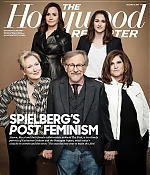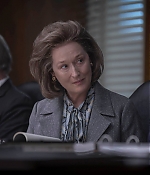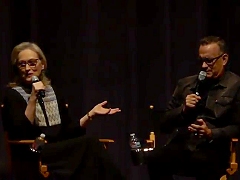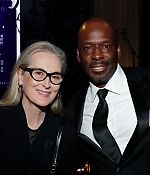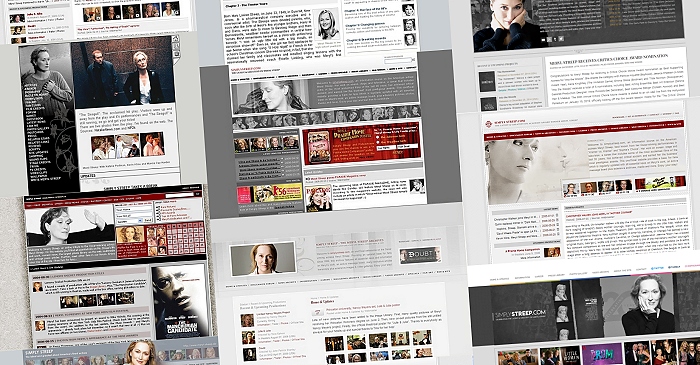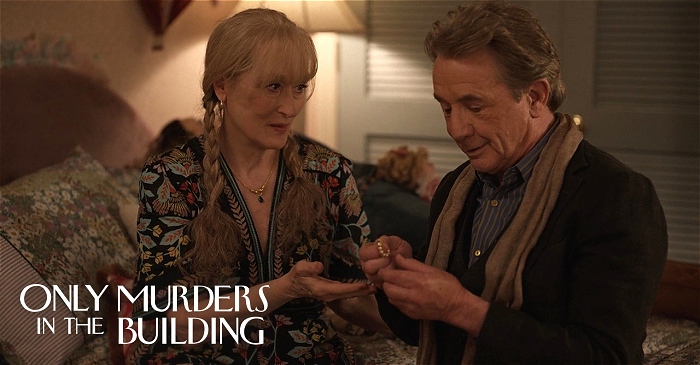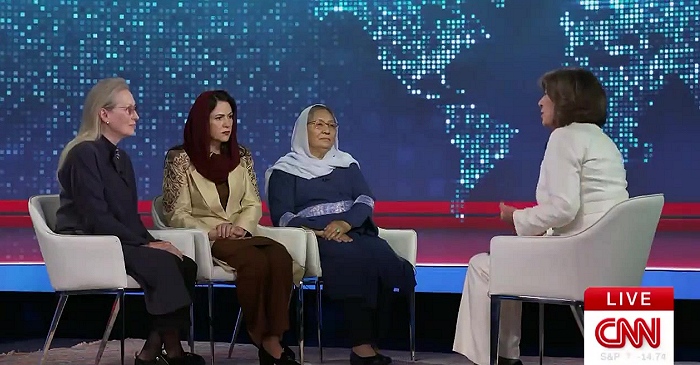
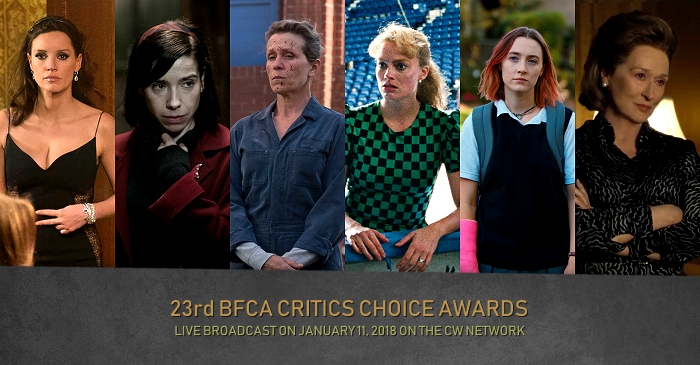
Congratulations to “The Post” and its makers for receiving 8 BFCA Critics’ Choice Awards today. The film was nominated in the categories Best Picture, Best Actor (Tom Hanks), Best Actress (Meryl Streep), Best Acting Ensemble, Best Director (Steven Spielberg), Best Original Screenplay (Liz Hannah and Josh Singer), Best Editing (Michael Kahn, Sarah Broshar) and Best Score (John Williams). The film “The Shape of Water” scored the most nomination with 14 nods. Streep shares the Best Actress category with Jessica Chastain (Molly’s Game), Sally Hawkins (The Shape of Water), Frances McDormand (Three Billboards Outside Ebbing, Missouri), Margot Robbie (I, Tonya) and Saoirse Ronan (Lady Bird). The ensemble category also includes Dunkirk, Lady Bird, Mudbound and Three Billboards Outside Ebbing, Missouri. The 23rd Annual Critics’ Choice Awards show will be produced by Bob Bain Productions and Berlin Entertainment. The BFCA and BTJA are represented by Dan Black of Greenberg Traurig and WME. Meryl Streep won the Critics Choice Award last year for Florence Foster Jenkins and in recent years for Julie & Julia and Doubt. Congratulations to all.
“Timely” is a word you’ll read often as the first wave of film critics have published their reviews of The Post, Steven Spielberg’s journalism drama about The Washington Post‘s efforts to publish The Pentagon Papers. Entertainment Weekly has assembled a collection of critics reviews. Though, despite the performances and the impressive ensemble of supporting players, one critic says it “isn’t quite a work of art,” due in part to the “boundingly busy and a little too expository” writing. Others agree, pointing to how characters deliver exposition “purely for the benefit of the audience.” In the end, the majority praised the “dynamic” film for using “the past to reinvigorate our resistance to the present,” accompanied by a “dynamite John Williams score” and Streep’s feminist-tinged delivery.
Chris Nashawaty (Entertainment Weekly)
“The beauty of Streep’s performance (and it’s one of her best in years) is how she lets you see her grow into the responsibility of her position. She elevates The Post from being a First Amendment story to a feminist one, too. Spielberg makes these crucial days in American history easy to follow. But if you look at The Post next to something like All the President’s Men, you see the difference between having a story passively explained to you and actively helping to untangle it. That’s a small quibble with an urgent and impeccably acted film. But it’s also the difference between a very good movie and a great one.”
Owen Glieberman (Variety)
“It’s a potently watchable movie that isn’t quite a work of art. Two of Spielberg’s recent history films were also made in a messianic spirit of topical fervor: Munich, a dread-inflected thriller that addressed the post-9/11 world, and Lincoln, a kind of dramatized time machine that commented on our own increasingly fractious and divided political arena. Yet both those films had a depth and mystery and power that transcended the moment; you could watch them 20 years from now and they would still echo. The Post, written by Liz Hannah and Josh Singer in a mode that’s boundingly busy and a little too expository, is a more functional, less imaginative movie — it’s high-carb docudrama prose rather than poetry. You can be stirred by what it’s saying and still feel that when it’s over, the film declares more than it reverberates.”

Here comes a great cover story by Hollywood Reporter, featuring interviews with Steven Spielberg, Meryl Streep, Amy Pascal, Liz Hannah and Kristie Macosko Krieger. “We are on the way to something better,” says Meryl Streep of the recent “earthquake” of harassment claims and female empowerment that has upended Hollywood, which many view as a direct response to the Trump administration. Certainly, the regime loomed large for Steven Spielberg when he first read The Post. “I realized this was the only year to make this film,” says the director, who tapped Streep to star as Washington Post publisher Katharine Graham despite the fact that he had only collaborated with her once before — for a single day of voice work on 2000’s A.I. Artificial Intelligence. “Most of the time we talked about how his property was haunted and did I know anybody who did exorcisms?” recalls Streep. “And of course, I did. I got him a priest.” The $50 million-plus Post tells the story of how Graham gave the green light to her editor Ben Bradlee (Tom Hanks) to report on the Pentagon Papers in 1971. (The New York Times had broken the story on the report, which revealed that America was losing the Vietnam War, but a court had ruled it couldn’t publish more about the top-secret documents.) Graham now faced a terrible dilemma: Go ahead with the Post’s article and risk imprisonment or withhold and silence the truth. Nearly half a century after she made her momentous choice, Graham’s tale is at last told. The complete interview can be read here. The cover and outtakes have been added to the photo gallery.
Nice in-depth article by the Hollywood Reporter. Also, check the following update for their cover story: In late February, Steven Spielberg hit a wall. Six years after he had started work on period piece The Kidnapping of Edgardo Mortara — and just weeks before he was due to start filming in Italy — he couldn’t find a boy to play the lead. In need of distraction, he picked up a spec screenplay that his CAA agents had sent him, and fell in love. The Papers, as the script was then called, didn’t just tell the story of The Washington Post’s Ben Bradlee and Katharine Graham, both of whom he knew; it also touched on one of the most relevant issues of the day: freedom of the press, and Graham’s decision to publish the Pentagon Papers in 1971, at the risk of losing her family-owned newspaper. After mulling things over, Spielberg told his longtime production partner, Kristie Macosko Krieger, that he was going to shut down Mortara and immediately jump onto the other film, which he wanted in theaters by the end of the year. “Everybody thought that I was off my rocker,” he admits. “But the great thing about having these decades-long collaborations is that the whole scrimmage swung to the left and we seriously started to prioritize the bare necessities.” “He said, ‘Can we make this movie this year? Can it come out this year?'” recalls Macosko Krieger. “So I [went] to my editorial staff, my postproduction crew, and said, ‘I know we can shoot it, but can we post it in time?’ Because we were also in postproduction on Ready Player One, the gigantic movie at Warner Bros. We sat down and did a giant war room, and we felt pretty confident that we could make it work. But we knew it would be tight.” The complete article can be read over at the Hollywood Reporter.
With the notable absence of President Donald Trump, the Kennedy Center on Sunday celebrated singers Lionel Richie and Gloria Estefan, rapper LL Cool J, television producer Norman Lear and dancer Carmen de Lavallade with honors for the arts. The Kennedy Center Honors are considered the highest recognition in the country for artists across many fields, and the importance of the annual event is usually underscored by a White House reception with the president and the first lady. Not this year. The White House said in August that Trump and his wife, Melania, would not attend, so that those honored could enjoy the event “without any political distraction.” The White House reception was also canceled after some honorees said they would boycott it. De Lavallade, 86, said she decided she could not attend such an event after Trump said both right- and left-wing extremists were at fault in a white supremacist rally in Virginia where one woman died. “Something in my soul … said no,” she told reporters. Meryl Streep kicked off a tribute to her one-time teacher De Lavallade, an actress and a dancer, who wiped tears from her eyes at the end of a powerful dance and musical performance of an American spiritual with a twist: “She’s Got the Whole World in Her Hands.” You can read more about the event over at Yahoo.com. CBS will broadcast the 40th Kennedy Center Honors show on Dec. 26. No official pictures of Streep’s appearance have been published so far.
The Massachusetts Conference for Women recently announced that Meryl Streep and Viola Davis will be keynote speakers at the Massachusetts Conference for Women on Dec. 7 at the Boston Convention and Exhibition Center. Adam Grant, top-rated Wharton Professor and best-selling co-author, with Sheryl Sandberg, of “Option B: Facing Adversity, Building Resilience, and Finding Joy” will also deliver a keynote address. “We are delighted to welcome Meryl Streep, Viola Davis and Adam Grant to the main stage in Boston,” said Gloria Larson, board chair of the Massachusetts Conference for Women. “This standout lineup of speakers, icons in the arts and in business, are sure to inspire attendees in ways they will long remember.” The 13th annual Massachusetts Conference for Women will host over 10,000 attendees for a full day of networking, inspiration, professional development and personal growth. In addition to a standout lineup of keynote speakers, the nonpartisan, nonprofit event will feature breakout sessions led by more than 150 experts and industry leaders about topical issues including building networks, branding, work-life balance, managing up, happiness and civility in the workplace and life. Registration is now open for the Conference and more exciting speaker announcements are to come. To register or learn more about the Conference, Opening Night and the Workplace Summit, visit maconferenceforwomen.org. Thanks to Frank for the heads-up.
The promotion for “The Post” is on a roll – here’s hoping it’ll last until its limited release on December 22. Yesterday, Meryl has attended a press conference for the film in Beverly Hills. On Monday, besides the aforementioned Q&A at the Directors Guild of America, a second Q&A has taken place at the SAG Foundation, with Streep, Hanks and Bradley Whitford in attendance. There are no official videos yet, so the mobile filmed ones have been added to the video archive, alongside a first batch of television spots.
Video Archive – Public Appearances – The Post Q&A at Directors Guild of America (2017)
Video Archive – Public Appearances – The Post Q&A at AMC Lincoln Square (2017)
Video Archive – Career – The Post – Television Spots
The National Board of Review today announced their 2017 honorees, with top honors including “The Post” as Best Film of the Year, Greta Gerwig as Best Director of the Year for “Lady Bird”, Tom Hanks as Best Actor of the Year for his performance in “The Post” and Meryl Streep as Best Actress of the Year for her performance in “The Post”. NBR President Annie Schulhof said, “The Post” is a beautifully crafted film that deeply resonates at this moment in time. We are so thrilled to award it our best film as well as to honor the wonderfully talented Greta Gerwig as our Best Director.” These awards are the latest citation of excellence by the National Board of Review, a tradition going back 108 years. This year 265 films were viewed by this select group of film enthusiasts, filmmakers, professionals, academics, students, many of which were followed by in-depth discussions with directors, actors, producers, and screenwriters. The National Board of Review’s awards celebrate excellence in filmmaking with categories that include Best Picture, Best Director, Best Actor and Actress, Best Original and Adapted Screenplay, Breakthrough Performance, and Directorial Debut, as well as signature honors such as the Freedom of Expression and the NBR Spotlight Award. The honorees will be feted at the National Board of Review Awards Gala, hosted by Willie Geist, on Tuesday, January 09, 2018 at Cipriani 42nd Street. This is Meryl Streep’s fifth honor by the National Board of Review. She has won Best Supporting Actress in 1979 for Manhattan, The Seduction of Joe Tynan and Kramer vs. Kramer, Best Actress in 1982 for Sophie’s Choice and two Ensemble awards in 2008 for Doubt and in 2009 for It’s Complicated”.

Thanks to IndieWire‘s Zack Sharf for assembling the first voices from critics who are allowed to speak about “The Post” on Twitter, while full reviews are embargoed until December 06, 2017. Steven Spielberg’s “The Post” is one of the last remaining Oscar contenders set to debut at the end of the year, and early reactions suggest the Pentagon Papers drama is going to be a major awards juggernaut. While we’ll have to wait a few more days for the review embargo to lift, critics who have seen the film have begun sharing their thoughts on social media and the first reactions are mostly glowing, especially in regards to Meryl Streep’s performance. “The Post” centers around the unlikely partnership between The Washington Post’s Katharine Graham (Streep), the first female publisher of a major American newspaper, and editor Ben Bradlee (Tom Hanks), as they race to publish to the Pentagon Papers and reveal the truth about America’s involvement in Vietnam. The movie was co-written by “Spotlight” Oscar winner Josh Singer and features an ensemble cast that includes Alison Brie, Carrie Coon, David Cross, Bruce Greenwood, Tracy Letts, and Bob Odenkirk. IndieWire’s David Ehrlich calls “The Post” Spielberg’s best film since “Munich” and is one of many critics singling out Streep’s lead performance as one of the best of her career. Alissa Wilkinson of Vox says Streep gives her “best performance in ages,” while Peter Sciretta of /Film calls her “amazing.” According to Mark Harris: “I will say that what Meryl Streep does in this movie, building a narrative about her character with each line, move, and gesture, is, even by her standards, astounding.” “The Post” opens in select theaters December 22. Check out a roundup of first reactions after the cut.

A lenghty, very interesting article on “The Post” by The Guardian: It has been described as a Hollywood all-star team’s riposte to Donald Trump. Steven Spielberg’s new film, The Post, headlined by Tom Hanks and Meryl Streep, dramatises the Washington Post’s publication of the classified Pentagon Papers, which exposed government lies about the Vietnam war. But while there are well chronicled parallels between the administrations and obsessions of Trump and Richard Nixon, the movie is also provoking debate about the role of media as watchdog – and whether a similar leak today would survive partisan attempts to discredit the messenger. Spielberg consulted Daniel Ellsberg, the Rand Corporation strategic analyst who leaked the Pentagon Papers – a top-secret 7,000-page document detailing US strategy in south-east Asia from 1945 to 1967 – to New York Times journalist Neil Sheehan in 1971. It was a bombshell that revealed the White House knew it was fighting an unwinnable war. After the Nixon administration won a court injunction that stopped the presses, Ellsberg gave a copy of the documents to the Post and 17 other newspapers. The Times and Post fought the order for 15 days until the supreme court overturned the ban in a 6-3 decision. Justice William Douglas wrote: “The dominant purpose of the first amendment was to prohibit the widespread practice of governmental suppression of embarrassing information.” But the justice department still pursued a vendetta against Ellsberg. He went on trial in 1973 on charges of espionage, conspiracy and stealing government property. The charges were dismissed due to gross governmental misconduct and illegal evidence gathering against him. The Pentagon Papers were declassified in 2011 and released for the public. The complete article can be read over at The Guardian with many thanks to Glenn for the heads-up.

